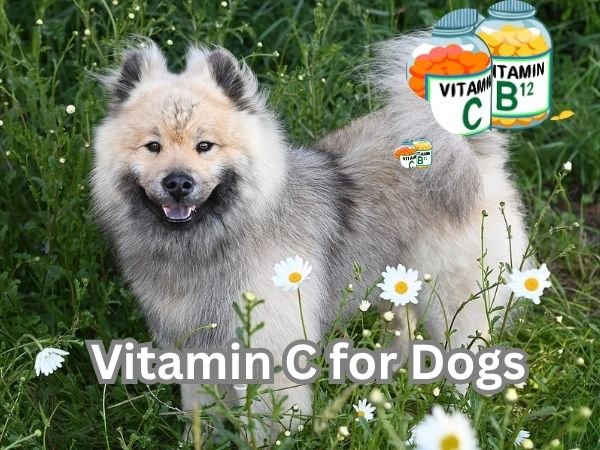
When it comes to keeping your dog happy and healthy, vitamin C for dogs and nutrition is always at the heart of the conversation. One question many pet owners are asking these days is, “Should I be adding vitamin C to my dog’s diet?” While it’s true that dogs can naturally produce their own vitamin C, research shows that extra vitamin C for dogs can be a real game-changer—especially during times of stress, illness, or as your pup gets older. Maybe you’ve noticed your dog slowing down, dealing with allergies, or just want to give them an extra immune boost—whatever the reason, you’re not alone in wondering how to safely add this powerful antioxidant to their meals.
In this easy-to-follow guide, we’ll explore 10 safe ways to add vitamin C to your dog’s diet, backed by expert advice and practical tips you can use right away. Whether you’re curious about natural food sources, supplements, or how much is too much, we’ve got you covered with clear answers and actionable steps. By the end, you’ll feel confident making informed choices to support your dog’s health and well-being—because every dog deserves the very best care.
Let’s dive in and discover how vitamin C for dogs could be the missing piece in your dog’s wellness routine!
What Is Vitamin C and Why Is It Important for Dogs?
Vitamin C is a well-known nutrient for humans, but what exactly is it, and why does it matter for dogs? Let’s explore what vitamin C is, it’s important roles in your dog’s body, and whether dogs need extra vitamin C supplements.
What Is Vitamin C?
- Also called ascorbic acid: Vitamin C is a natural vitamin, scientifically known as ascorbic acid. It comes in different forms, including ascorbic acid itself and mineral salts like calcium ascorbate or sodium ascorbate, which are gentler on the stomach and easier for dogs to absorb.
- Water-soluble vitamin: This means vitamin C dissolves in water and is not stored in the body. Any extra vitamin C your dog doesn’t use is flushed out through urine.
- Dogs make their own vitamin C: Unlike humans, dogs can produce vitamin C naturally in their livers. This internal production usually meets their daily needs without requiring extra from food or supplements.
Why Is Vitamin C Important for Dogs?
Vitamin C plays several key roles in keeping your dog healthy and active:
1. Immune System Support
Vitamin C helps strengthen your dog’s immune system. It supports white blood cells, which fight infections and keep your dog healthy. It also helps the body produce proteins that defend against diseases.
2. Powerful Antioxidant
Vitamin C acts as an antioxidant, meaning it protects your dog’s cells from damage caused by harmful molecules called free radicals. This protection reduces the risk of diseases and slows down aging.
3. Collagen Production
Collagen is a protein that forms the structure of skin, joints, bones, and connective tissues. Vitamin C is essential for making collagen, which helps keep your dog’s joints strong and skin healthy.
4. Wound Healing and Tissue Repair
Vitamin C supports healing by helping the body repair tissues after injuries or surgery. It speeds up recovery and keeps your dog feeling better faster.
5. Joint Health
By aiding collagen production and reducing inflammation, vitamin C helps maintain healthy joints. This is especially important for older dogs or those with joint problems like arthritis or hip dysplasia.
Signs Your Dog Might Have a Vitamin C Deficiency
Vitamin C deficiency is very rare in dogs because they produce it naturally. However, if it does occur, you might notice:
- Weakness or lethargy
- Swollen or bleeding gums
- Slow healing of wounds
- Joint pain or limping
- Bad breath or dental problems
- Skin problems like spots or irritation
If you see these signs, it’s important to visit your vet for a proper diagnosis.
Potential Benefits of Vitamin C Supplementation
Adding vitamin C under the right circumstances can:
- Boost your dog’s immune system to fight infections better
- Help reduce inflammation and ease joint pain
- Speed up healing after injuries or surgery
- Support healthy skin and coat
- Act as an antioxidant to protect cells from damage
Why Veterinary Consultation Is Essential
Before giving your dog any vitamin C supplements, always talk to your veterinarian. Here’s why:
- Correct Dosage: Dogs vary in size, age, and health, so the right amount of vitamin C depends on your dog’s specific needs. Too much vitamin C can cause stomach upset or other problems.
- Avoid Risks: Excess vitamin C can sometimes lead to issues like bladder stones, especially in male dogs.
- Proper Diagnosis: Some symptoms might look like vitamin C deficiency but could be caused by other health problems needing different treatments.
- Safe Supplement Choice: Not all supplements are made equally. Your vet can recommend safe and effective products.
10 Safe Ways to Add Vitamin C to Your Dog’s Diet
Vitamin C is a helpful nutrient for dogs, especially for their joint health and immune system. While dogs can make some vitamin C naturally, adding extra from safe sources can support their well-being. Here are 10 easy and safe ways to include vitamin C in your dog’s diet, explained simply.
1. Fresh Fruits and Vegetables
Many fruits and veggies are rich in vitamin C and safe for dogs to eat in small amounts. Some good choices are:
- Blueberries
- Strawberries
- Broccoli (steamed or raw in small amounts)
- Brussels sprouts (cooked, not raw)
- Cantaloupe
- Sweet potatoes (cooked and mashed)
- Parsley (a little sprinkle)
These can be given as snacks or mixed into meals. Always introduce new foods slowly to avoid tummy upset.
2. Homemade Dog Treats with Vitamin C
You can make simple treats at home using vitamin C-rich ingredients. Here’s a quick recipe idea:
- Mix whole wheat flour, rolled oats, mashed sweet potato, and pureed blueberries or strawberries.
- Add an egg to bind the dough.
- Shape into small treats and bake until golden.
This way, your dog enjoys tasty snacks packed with vitamin C and other nutrients.
3. Commercial Dog Foods with Added Vitamin C
Many good-quality dog foods already include vitamin C as part of their formula. Feeding a trusted commercial brand is an easy way to ensure your dog gets enough vitamin C without extra effort.
4. Vitamin C Supplements (Chewables, Powders, Liquids)
If you want to give a more precise dose, vitamin C supplements come in different forms:
- Powders like sodium ascorbate or calcium ascorbate (gentle on the stomach)
- Chewable tablets made for dogs, which can be treats themselves
- Liquid drops that mix easily into food
Always check with your vet for the right type and amount for your dog.
5. Organ Meats
Organ meats such as liver, kidney, and heart are natural sources of vitamin C for dogs. They are also packed with other vitamins and minerals that support overall health. You can add small amounts of cooked organ meats to your dog’s meals as a nutritious boost.
6. Herbal Sources
Certain herbs contain vitamin C and can be used safely in small amounts with your vet’s approval. Examples include:
- Peppermint
- Red clover
- Raspberry leaf
- Paprika (use very sparingly)
Herbs can be added fresh or dried to meals or treats for extra nutrition.
7. Adding Vitamin C to Wet Food
If your dog eats wet food, you can mix vitamin C-rich foods or supplements right in. For example, add a spoonful of pureed broccoli or a sprinkle of vitamin C powder. Just be sure to mix well and serve fresh.
8. Fortified Dog Treats
Look for commercial dog treats that naturally contain or are fortified with vitamin C. These treats offer a convenient way to support your dog’s vitamin intake while rewarding them.
9. Vitamin C-Enriched Broths
Making homemade broths with vitamin C-rich vegetables like carrots, broccoli, and parsley is a tasty way to add nutrients. Simply simmer the veggies in water, strain, and add the broth to your dog’s food for a flavorful, healthy boost.
10. Vet-Prescribed Vitamin C Protocols
Sometimes, your vet may recommend vitamin C supplements for specific health needs or conditions. Follow their advice carefully on dosage and form. This ensures safe and effective supplementation tailored to your dog’s situation.
Adding vitamin C to your dog’s diet can be done safely and easily through fresh fruits and veggies, homemade or commercial treats, supplements, organ meats, herbs, and even broths. Always introduce new foods gradually and consult your veterinarian before starting supplements. This way, you help keep your dog’s joints, immune system, and overall health in great shape.
Choosing the Right Form of Vitamin C for Your Dog
Vitamin C is a helpful nutrient for dogs, especially for supporting their immune system and joint health. However, not all forms of vitamin C are the same. Some types are easier on your dog’s stomach and absorb better in the body. Here’s a simple guide to the main forms of vitamin C you might find for dogs, and tips on how to use them safely.
Different Forms of Vitamin C for Dogs
1. Ascorbic Acid
This is the most common form of vitamin C and is often found in human supplements. It is acidic and can sometimes upset your dog’s stomach, causing diarrhea or discomfort, especially if given in large amounts. Dogs do not absorb ascorbic acid as well as some other forms, so it’s usually not the best choice for sensitive dogs.
2. Sodium Ascorbate
Sodium ascorbate is a buffered form of vitamin C, meaning it is less acidic and gentler on the stomach. It is absorbed well and stays in the body longer than ascorbic acid. Because it is mild, dogs of all ages can usually tolerate it well. It is also often recommended because it is effective and affordable.
3. Calcium Ascorbate
Calcium ascorbate is another buffered, pH-neutral form of vitamin C. It is gentle on the digestive system and less likely to cause upset. Plus, it provides a small amount of calcium, which can be beneficial for puppies or older dogs needing extra bone support.
4. Ester-C
Ester-C is a patented form of vitamin C that is non-acidic and gentle on the stomach. It is believed to be absorbed easily and may stay in the body longer. Ester-C is less likely to cause digestive issues and is a good option for dogs with sensitive stomachs.
5. Liposomal Vitamin C
This is a newer form where vitamin C is wrapped in tiny fat-like particles called liposomes. This helps vitamin C absorb better and reach more parts of the body. Liposomal vitamin C is considered highly bioavailable and gentle, but it is usually more expensive and less common.
Which Forms Are Gentler and More Bioavailable?
- Gentler on the stomach: Sodium ascorbate, calcium ascorbate, and Ester-C are all pH-neutral forms that are easier on your dog’s tummy compared to ascorbic acid.
- More bioavailable (absorbed better): Sodium ascorbate and liposomal vitamin C tend to have higher bioavailability, meaning your dog’s body can use them more effectively.
Safety Tips and Common Mistakes
Gradual Introduction
When adding vitamin C to your dog’s diet, start with a small amount. Slowly increase the dose over several days while watching for any signs of stomach upset like diarrhea or vomiting. This helps your dog’s body adjust and reduces the chance of side effects.
Watch for Side Effects
Too much vitamin C can cause problems such as:
- Diarrhea or loose stools
- Stomach cramps or nausea
- Increased thirst or urination
- Urinary issues, including the risk of bladder stones in some dogs
If you notice any of these signs, reduce the dose or stop giving vitamin C and talk to your vet.
Avoid Excessive Dosing
Dogs naturally produce vitamin C in their bodies, so they usually do not need large extra amounts. Giving too much can lead to gastrointestinal upset or urinary problems. Always follow your veterinarian’s advice on the right amount for your dog’s size and health.
Consult Your Veterinarian
Before starting any vitamin C supplement, it’s important to check with your vet. They can help you choose the right form and dose based on your dog’s age, breed, health condition, and diet. This ensures your dog gets the benefits safely without risks.
Conclusion
Vitamin C offers many benefits for dogs, especially when it comes to their overall health and joint care. It supports the immune system, helps reduce inflammation, aids in healing, and promotes strong joints and connective tissues. This nutrient acts as a powerful antioxidant and plays a key role in making collagen, which is essential for healthy joints and skin.
FAQ
Can dogs overdose on vitamin C?
Yes, but it’s rare. Too much vitamin C may cause diarrhea, upset stomach, or kidney stones. Dogs usually pass the extra vitamin C through urine, but always talk to your vet before giving supplements.
What are the signs of vitamin C deficiency in dogs?
Signs include low energy, joint pain, slow healing, and frequent sickness. Though dogs make their own vitamin C, stress or illness can lower their levels. A vet can help check for a deficiency.
Are there any breeds that need more vitamin C?
Some large breeds, senior dogs, or those with joint issues may benefit from extra vitamin C. It helps support their immune system and joints, but always ask your vet before adding supplements.
Is human vitamin C safe for dogs?
Sometimes, but not always. Human vitamin C can be too strong or have added ingredients harmful to dogs. Use dog-safe vitamin C or ask your vet for the right type and dose.
How much vitamin C should I give my dog?
The amount depends on your dog’s size, age, and health. Most healthy dogs don’t need extra vitamin C. If supplements are needed, your vet can suggest the right dose for your dog.



